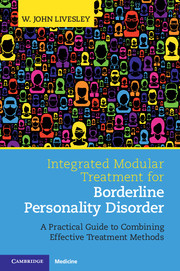 Integrated Modular Treatment for Borderline Personality Disorder
Integrated Modular Treatment for Borderline Personality Disorder Book contents
- Frontmatter
- Dedication
- Contents
- Preface
- Section 1 Introduction and Framework for Understanding Borderline Personality Disorder
- Section 2 Assessment and Treatment Planning
- Section 3 General Treatment Modules
- Introduction
- 7 General Treatment Module 1: Structure
- 8 General Treatment Module 2: Treatment Relationship
- 9 General Treatment Module 3: Consistency 101ment Module 3: Consistency
- 10 General Treatment Module 4: Validation
- 11 General Treatment Module 5: Self-Reflection
- 12 General Treatment Module 6: Motivation
- Section 4 Safety, Containment, and Engagement: The Initial Phase of Treatment
- Section 5 Improving Emotional Regulation and Modulation
- Section 6 Exploration and Change: Treating Interpersonal Problems
- Section 7 Constructing an Adaptive Sense of Self
- Section 8 Retrospect and Prospect
- References
- Index
12 - General Treatment Module 6: Motivation
from Section 3 - General Treatment Modules
Published online by Cambridge University Press: 16 February 2017
- Frontmatter
- Dedication
- Contents
- Preface
- Section 1 Introduction and Framework for Understanding Borderline Personality Disorder
- Section 2 Assessment and Treatment Planning
- Section 3 General Treatment Modules
- Introduction
- 7 General Treatment Module 1: Structure
- 8 General Treatment Module 2: Treatment Relationship
- 9 General Treatment Module 3: Consistency 101ment Module 3: Consistency
- 10 General Treatment Module 4: Validation
- 11 General Treatment Module 5: Self-Reflection
- 12 General Treatment Module 6: Motivation
- Section 4 Safety, Containment, and Engagement: The Initial Phase of Treatment
- Section 5 Improving Emotional Regulation and Modulation
- Section 6 Exploration and Change: Treating Interpersonal Problems
- Section 7 Constructing an Adaptive Sense of Self
- Section 8 Retrospect and Prospect
- References
- Index
Summary
Motivation for change predicts outcome. Unfortunately, motivation varies considerably in patients with borderline personality disorder (BPD), and many are not highly committed to therapeutic work at least in the early stages of therapy, which leads to poor compliance and high treatment dropout. Motivation is undermined by passivity and demoralization, expectations that someone or something will provide solutions, and a desire to use therapy only as a source of support. Motivation can also be impeded by external factors such as friendships and relationships. For example, significant others who have become accustomed to how the patient behaves may react adversely to attempts to behave differently, especially when these changes affect a status quo that they find comfortable.
Consequently, ambivalence about treatment is common: many patients want help but worry about the process, are doubtful about its potential benefits, and are concerned about the effort required. This means that motivation for change cannot be a prerequisite for treatment. Instead, therapists need to become skilled in building motivation: studies show that effective therapists are good at motivating their patients. Readiness to change is not static: it fluctuates according to the effort involved and the level of distress that is anticipated to result from working on a problem. Motivation also depends of the focus of change: it is common for patients to be highly motivated to improve emotional stability but not to work on interpersonal problems or consequences of abuse because of the fears and shame involved. Although poor motivation is a serious problem, there is little research on how best to motivate patients with BPD, forcing us to draw on studies involving other disorders and the general literature on building motivation such as motivational interviewing to identify useful methods.
Strategies for Building Motivation
Motivation is influenced by other generic interventions. It is closely related to the quality of patient–therapist bond and hence the alliance should be reviewed whenever motivational problems arise. Validation and empathy also help to create a context conducive to a commitment to change. As with other generic interventions, no single intervention dramatically increases motivation. Instead, a commitment to change is built through repeated use of diverse strategies.
- Type
- Chapter
- Information
- Integrated Modular Treatment for Borderline Personality DisorderA Practical Guide to Combining Effective Treatment Methods, pp. 123 - 132Publisher: Cambridge University PressPrint publication year: 2017


